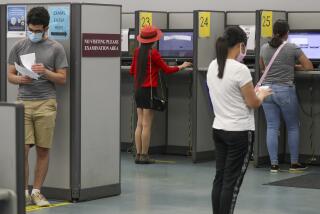Giving Holiday Imbibers a Break
- Share via
MEXICO CITY — The first man caught in the drunk-driving dragnet was a 32-year-old Spaniard who had been guiding his car down this city’s Avenida Reforma, apparently confident that as long as he kept going straight, no one would stop him.
After being pulled over at a checkpoint staffed by police, doctors and human rights monitors, Juan Jose Martinez puckered up to a Breathalyzer machine, put in place by a city program that is slowly changing attitudes about drinking and driving.
“This is a surprise!” Martinez said after his September arrest. Moments later, he was carted off to jail, uttering a series of Castilian oaths that can’t be translated into polite English.
Launched four months ago amid much controversy, the Drive Without Alcohol program of random breath tests has reached a turning point this holiday season.
Despite statistics showing that car accidents are down since the program’s inception, city officials decided to suspend it on Christmas Eve and will also suspend the checkpoints on New Year’s Eve.
On a night of the most rampant revelry, Mexico City could return to the old unofficial tolerance of drinking and driving, an environment that has led to the deaths of several hundred people each year in alcohol-related car accidents.
“People drink on the 24th, but it’s more of a family thing,” said Manuel Mondragon, an official with the city’s Public Safety Secretariat. In addition, the city wanted to give police a chance to celebrate the holiday at home with their families. “I don’t think we’ll have the same problems,” he said.
“Before, the police wouldn’t stop you unless you ran into something or someone,” Stephanie Jimenez remarked as she nursed a beer at St. Patrick’s Pub in the city’s Condesa district.
“And even if the police did stop you for something else and you were drunk, you could bribe them and they would let you go,” said her friend Leon Olvera.
Like most people at the bar, which caters to a distinctly younger-than-30 crowd, Olvera and Jimenez thought the random breath tests were long overdue. The months since the program’s launch have brought a marked changed in their friends’ behavior, they said.
“At first, it caused a general panic,” said Olvera, 23. “The idea of spending a night in jail scared people. They started to say, ‘Maybe we should take taxis instead.’ People started to get some consciousness about the issue.”
“What it boils down to is that we Mexicans will only change if you force us to,” said Jimenez, also 23.
The city has also rewritten its laws so that intoxicated drivers must face a judge and spend six to 18 hours in jail. Before, most escaped with a fine.
“They say it’s not so bad in the lockup,” Jimenez said. “They make you chilaquiles for breakfast,” a traditional dish of tortillas and chile sauce.
Many politicians continue to resist the tests and checkpoints. Leaders of the opposition Institutional Revolutionary Party call the program an unfair infringement on civil liberties.
“The way the program is being implemented is in violation of the constitution,” said Florentino Castro, the party’s municipal president.
Others have tried to find a way around the law. In the program’s first week, one man bribed a judge with $50 so another man could serve his 15-hour sentence.
Last week, an expose in the Reforma newspaper detailed how a popular Mexico City bar had established an intelligence network to inform its customers of the checkpoint locations so they could avoid the alcoholimetros, as the Breathalyzers are known.
A Reforma reporter watched as a police patrol stopped at the bar and spoke to its security guards. The guards later passed the scoop to the bar’s clientele: “The alcoholimetro is at the corner of Insurgentes and Parroquia!”
Other restaurants offer their customers remedies, such as carbonated mineral water, that are supposed to help them recover from the effects of alcohol. And many bars in the central Zona Rosa district have installed Breathalyzers in their restrooms for customers to see if they are too drunk to drive.
“Some people say they drive better when they’re drunk, but that’s a lie,” said Juan Carlos Ortiz de Montellano, 29. “My friends and I have been tested several times, and they’ve always treated us nice.”
In the first three months of the program’s inception, officials said, the number of people injured in alcohol-related car accidents decreased by 48%.
Wolf Kisel, the owner of St. Patrick’s Pub, said he welcomed the checkpoints and would like them to remain in place throughout the holidays. “Drinking and talking with your friends is part of the culture and a healthy activity,” he said. “But getting so drunk that you can’t walk out the door isn’t.”
More to Read
Sign up for Essential California
The most important California stories and recommendations in your inbox every morning.
You may occasionally receive promotional content from the Los Angeles Times.














